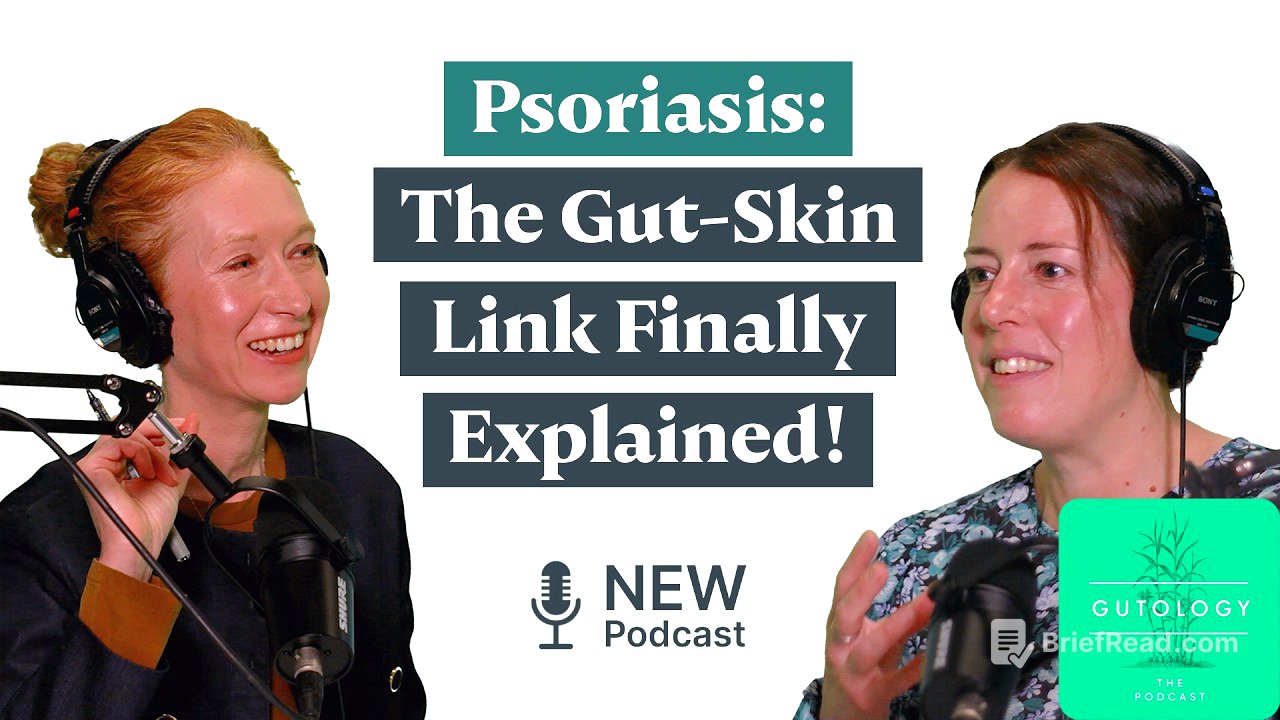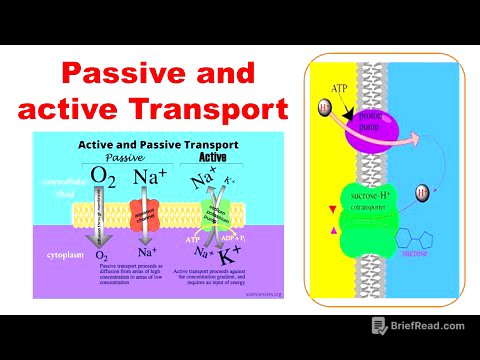TLDR;
This Gutology podcast episode features functional practitioner Julia Davies and nutritional therapist Emma Gold discussing psoriasis, an inflammatory skin condition. They explore the gut-skin connection, the autoimmune nature of psoriasis, and holistic management strategies. Emma shares her personal journey with psoriasis and how it led her to specialise in nutritional therapy. The episode also includes calls from listeners seeking advice on managing their psoriasis. Key takeaways include the importance of addressing gut imbalances, managing stress, supporting liver detoxification, and optimising the circadian rhythm for skin health.
- Psoriasis is a chronic autoimmune condition affecting millions worldwide, with plaque psoriasis being the most common form.
- Gut health plays a significant role in psoriasis due to the potential for toxins crossing a leaky gut and triggering an immune response.
- Stress management, liver support, and optimising the circadian rhythm are crucial aspects of holistic psoriasis management.
Emma's Journey into Nutritional Therapy [0:30]
Emma Gold recounts her personal experience with psoriasis, which began after the birth of her first daughter and worsened following her son's birth. Initially, steroid creams provided relief, but during her pregnancy with her son, she sought alternative treatments. A stressful house sale led to a severe flare-up, prompting her to research natural methods. She discovered a book recommending a strict elimination diet, which initially worsened her condition before leading to complete clearance within 10 days. This experience motivated her to study nutritional therapy to understand the underlying mechanisms behind her recovery and the gut-skin link.
Understanding the Driving Forces Behind Psoriasis [3:17]
Emma discusses how her understanding of psoriasis has evolved since becoming a nutritional therapist. She highlights that while elimination diets can be effective, they may not address the root cause. Through microbiome, blood, and genetic testing, she discovered yeast overgrowths, gram-negative bacteria, and parasites in her gut, which contributed to toxin production. She emphasises the importance of supporting the liver during detoxification to manage the toxins released as these organisms die off. Emma also mentions the role of genetics in predisposing individuals to psoriasis.
What is Psoriasis? [4:43]
Psoriasis is defined as a chronic autoimmune condition affecting approximately 125 million people. Plaque psoriasis, the most common type, involves an accelerated skin turnover, resulting in thickened plaques. Other forms include gutate psoriasis (linked to strep throat), nail psoriasis, scalp psoriasis, and inverse psoriasis (occurring in skin folds). The autoimmune aspect involves an overactive immune system and inflammatory cytokines, often triggered by gut-related issues such as leaky gut and toxin production. Joint pain and inflammation are commonly associated with psoriasis.
The Role of the Liver in Psoriasis [7:26]
The discussion centres on the liver's role in psoriasis, particularly in the context of leaky gut and gram-negative bacteria. Toxins like LPS (lipopolysaccharide) from bacteria such as klebsiella and citrobacter cross the compromised gut barrier, activating the immune system and burdening the liver with detoxification. Supporting all phases of liver detoxification is crucial to package these toxins into bile for elimination. LPS is highly inflammatory and can exacerbate psoriasis symptoms. Maintaining gut barrier integrity is essential to prevent LPS from entering the bloodstream.
Gut Barrier Integrity and Mucosal Lining [9:55]
The integrity of the gut barrier and the mucosal lining are discussed as key factors in psoriasis. Secretory IgA, a marker of the mucosal lining, indicates the strength of this barrier. Low levels suggest a weakened lining, while high levels indicate immune activation. Vitamin A, vitamin D, and immunoglobulins are important for building and maintaining the mucosal lining. Stress, impaired digestion, and insufficient fat intake can compromise the mucosal lining, affecting the absorption of fat-soluble vitamins like A and D. Bile flow is also crucial for fat emulsification and vitamin absorption.
Supporting the Gallbladder and Bile Production [13:01]
Tips for supporting the gallbladder and bile production are provided, focusing on incorporating bitter foods like rocket, watercress, and radish into the diet 15-30 minutes before meals. These foods stimulate the digestive system. Assessing bowel movements for stickiness or fatty residue can indicate fat malabsorption issues.
Holistic Management of Psoriasis [13:26]
The holistic management of psoriasis is discussed, with stress identified as a significant factor. Mindful eating practices, such as relaxing before meals, chewing thoroughly, and using bitters, can improve digestion. Stress reduction lowers cortisol levels and protects the mucosal lining. Epsom salt baths are recommended for their relaxing properties and magnesium absorption, which acts as a natural tranquiliser and supports liver sulfation pathways.
The Role of Cortisol and Circadian Rhythm [15:11]
The role of cortisol in psoriasis is explored, noting that while cortisol is naturally anti-inflammatory, chronic stress can lead to cortisol dysregulation and inflammation. Optimising cortisol patterns through diet, such as eating a heavier meal earlier in the day, can improve digestion. Intermittent fasting is also discussed, with a general recommendation of 12 hours overnight, but individual responses vary. A high-protein breakfast is suggested to balance blood sugar and hormones. Monitoring insulin sensitivity and blood sugar levels can be beneficial in managing psoriasis.
Caller 1: Managing Psoriasis with Environmental and Lifestyle Adjustments [19:58]
A caller shares their experience of managing psoriasis through environmental adjustments, such as removing dust mites and regularly washing sheets. They note that cold weather worsens their condition, while limited sun exposure can be helpful. Julia suggests getting sunlight at sunrise to help with circadian rhythm, which is often disrupted in psoriasis. The caller, who is nomadic, finds this advice helpful as they can follow the sunrise wherever they are. Epsom salt baths at night are also recommended.
Caller 1: Dietary Considerations and Protein Intake [26:26]
The caller discusses their efforts to reduce sugar and chocolate intake, highlighting the challenges of breaking these habits. Emma recommends focusing on protein intake to stabilise blood sugar levels. The caller, who primarily eats fish and avoids meat, inquires about protein sources. Emma suggests legumes, quinoa, nuts, and seeds, recommending 80-100 grams of protein per day, depending on body weight and activity level. Gluten-free sourdough bread is discussed as a carbohydrate option, with a focus on avoiding refined sugars and processed gluten-free alternatives.
Caller 2: Medication, Stress, and Potential Triggers [31:55]
A caller describes their experience with increasingly severe psoriasis, now managed with medication after topical steroids became insufficient. They express a desire to find alternative solutions to lifelong medication. Emma emphasises optimising overall well-being to improve skin health. The caller notes that their condition worsened during lockdown and coincided with starting studying and marathon training. Julia suggests adaptogens to support stress resilience and explores potential mechanisms by which stress impacts the skin, such as microbiome changes or immune suppression.
Caller 2: Dietary Changes, Infections, and the Gut-Skin Connection [41:56]
The caller recounts cutting out gluten and dairy without significant improvement, leading to the belief that deeper imbalances are at play. A flare-up coincided with antibiotic use for a skin infection, potentially negating dietary benefits. Julia and Emma discuss how stress can affect digestion and nutrient absorption, leading to nutritional depletion. The caller also mentions a weight loss journey involving excessive sugar intake, which may have contributed to the problem.
Caller 3: Restrictive Diet and Potential Histamine Issues [46:11]
A caller describes managing psoriasis with a very restrictive diet, eliminating most fruits and vegetables. While effective in the past, it's currently less successful. Julia notes that such diets can be helpful for inflammatory conditions due to the elimination of plant toxins. Emma explores potential histamine issues, as the caller experiences hives. She suggests addressing gut imbalances and candida overgrowth before restricting high-histamine foods. Salicylates, also restricted in the caller's diet, can inhibit DAO, an enzyme that breaks down histamine.
Caller 3: Exploring Underlying Factors and Environmental Toxins [55:41]
The discussion shifts to exploring underlying factors contributing to the caller's psoriasis, as the restrictive diet is no longer fully effective. Julia suggests considering stress, relationships, work issues, and environmental toxins like cleaning chemicals, air fresheners, and pollution. Emma recommends assessing nutritional status, particularly B vitamins, which are essential for DAO production and histamine breakdown.
Dietary Considerations and the Mental Effects of Psoriasis [58:44]
The conversation addresses the mental effects of psoriasis and the potential for unhealthy habits around food due to strict elimination diets. Emma emphasises that it's not the fault of the food, but rather underlying imbalances in the body. Julia notes that people often prefer to attribute their condition to food intolerances rather than addressing nervous system dysregulation from chronic stress. Both agree that dietary changes should be approached in a loving way, nourishing the body rather than creating stress.
Practical Tips and Lifestyle Adjustments for Managing Psoriasis [1:03:39]
Practical tips for managing psoriasis are summarised, including Epsom salt baths, supporting liver detoxification with cruciferous vegetables and adequate water intake, and ensuring sufficient protein digestion. Omega-3 intake is highlighted as crucial for reducing inflammation, and testing omega-3 to omega-6 ratios is recommended. Emma advises starting with small, manageable changes and gradually building on them. Julia emphasises the importance of getting outdoors for circadian rhythm regulation and suggests eating meals at consistent times each day.









